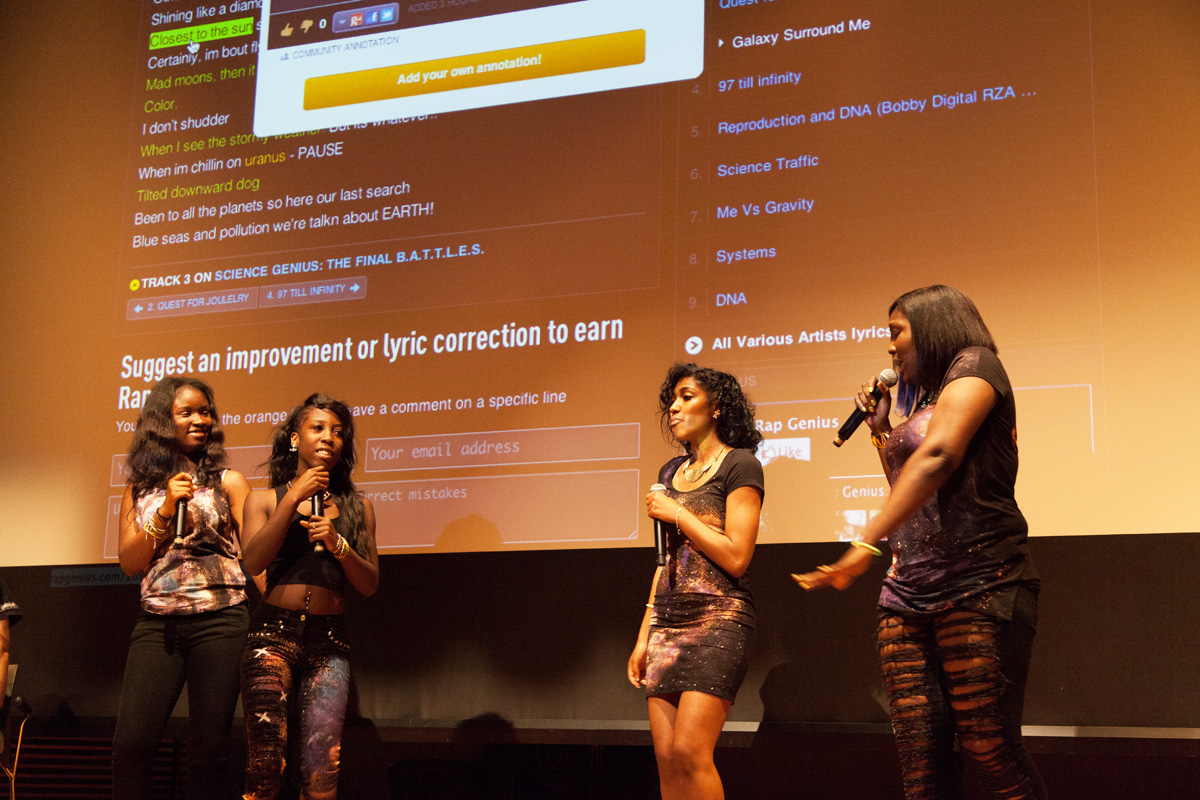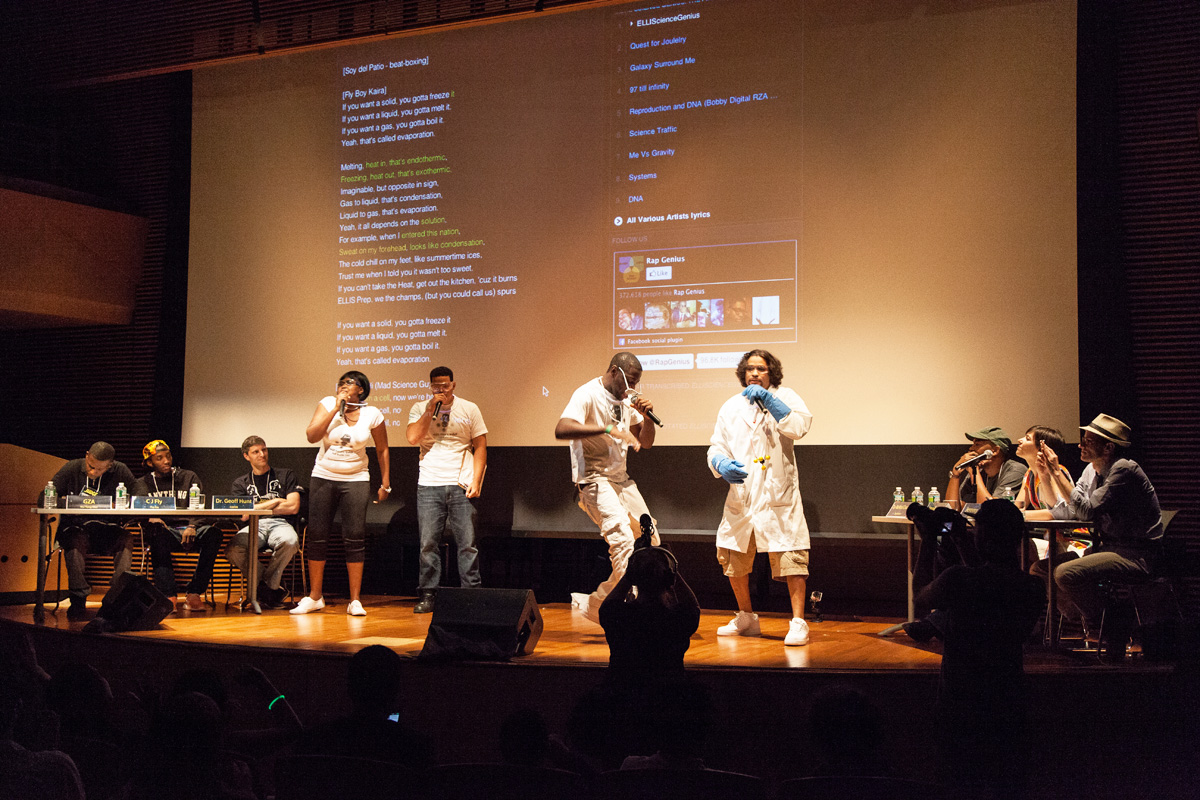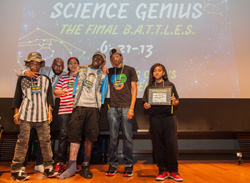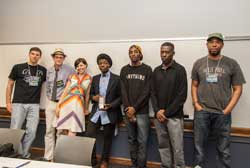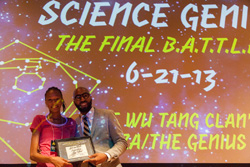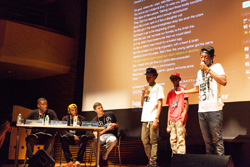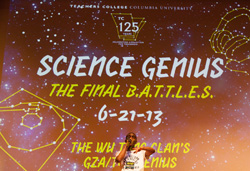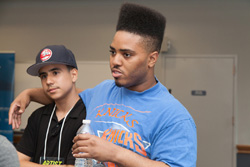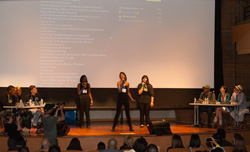Filed Under > Curriculum
Science Genius B.A.T.T.L.E.S. Judges Choose Winning Science Rap
Jabari Johnson, a senior at Urban Assembly High School in Harlem, won the final Science Genius competition at TC with a rap about a physics formula
Johnson, a solo act among nine performances that evening, took the top prize with a high-energy, rapid-fire rap about the physics formula work equals force times distance. He won the opportunity to make a professional recording of his song, post it on the Rap Genius website and have the lyrics annotated by some of the best rappers in the business. He’ll also receive a personalized tour of the American Museum of Natural History with GZA/the Genius, an original member of the iconic hip-hop band the Wu Tang Clan who is adding science content to his new raps.
B.A.T.T.L.E.S. (Bringing Attention to Transforming, Teaching and Learning Science) was conceived as a way to keep students engaged in school and in science. The contest is the brainchild of GZA, Christopher Emdin, Assistant Professor of Science Education at Teachers College; and Rap Genius, which runs rapgenius.com, a website where rap is posted, critiqued as poetry and annotated. GZA and Jeremy Dean of Rap Genius were among the six judges who watched as teens ages 14 to 20 strode the stage at TC’s Joyce B. Cowin Conference Center and “spat” lyrics that ran a gamut of topics from rock science, natural selection and genetics to how materials freeze or melt. The raps were judged on the quality of their scientific content as well as their lyricism and beat.
About 300 New York City public high school students participated in the project. Some worked behind the scenes on the performances, writing, choreographing, or providing background music. In schools where more than one act entered, students voted on who should represent them at the final competition. A yet-to be released study by Emdin found that students who participated in Science Genius B.A.T.T.L.E.S. outperformed their non-participating peers on science tests.
“The best-case scenario in science classrooms is that it’s inter-disciplinary,” Emdin told the PBS News Hour earlier this year. “So they’re learning science content, but they’re also learning to write, and they’re also learning reflection, and they’re also learning critical thinking, and they’re also learning revision, and they’re also learning performance – all while learning science.”
In addition to Johnson, the finalists who competed at TC included Alicia Duncan, a soloist from Arts and Media Preparatory High School; Athen Griffith, Donte Reeves and Delgado Browne from August Martin High School; Victoria Richardson, Ashante Martin and Ashley Guzman from Bronx Compass High School; Tyrell Roberts, Randy Walton, Aneudy Tavarez, Trejhour Lewis and Tyanna Marquez from Brooklyn Community Arts and Media High School; Musa Kaira, Awa Touray and Alexander Ceballos from Ellis Preparatory Academy in the Bronx; Similoluwa Adelekan, Michelle Gonzalez, Meagan McKenzie and Saran Doumbouya from Marie Curie High School in the Bronx; Ryan Rivera, assisted by Clifford Johnson from Park East High School; and Jahleel Cephus from Validus Preparatory High School.
Joining GZA and Dean as judges were: Jennifer Bogo of Popular Science magazine; Ta-Nehisi Coates, senior editor and cultural columnist at The Atlantic magazine; the rapper C.J. Fly; and Geoff Hunt, PhD, Public Outreach Coordinator at the American Society for Biochemistry and Molecular Biology.
According to the National Assessment of Educational Progress, only 4 percent of African-American high school seniors are proficient in the sciences. Emdin, GZA and Rap Genius would like to expand the B.A.T.T.L.E.S. project next year and eventually create a national competition. By engaging students who are interested in hip-hop, they argue, the project has the potential to hook teenagers on science and encourage them to stay in school. Ultimately, more young people could pursue careers in science, where the demand for qualified applicants currently outstrips the supply.
The students “love hip-hop; they don’t like science,” Emdin told PBS News Hour. “Let’s find a way to figure it out.”
For a video synopsis of the final competition event, go here.
The New York Times and ABC News did stories about the final B.A.T.T.L.E.S. competition.
See the whole Science Genius B.A.T.T.L.E.S. at TC's YouTube channel.
Published Wednesday, Jun. 26, 2013
